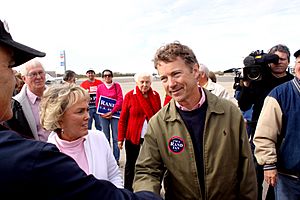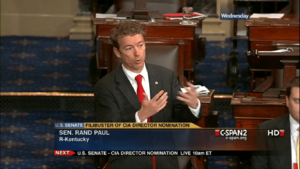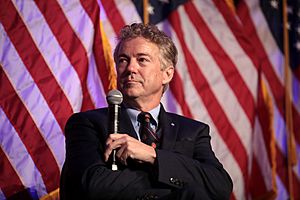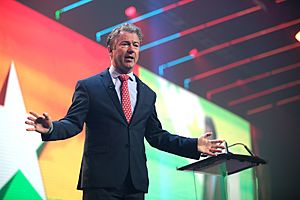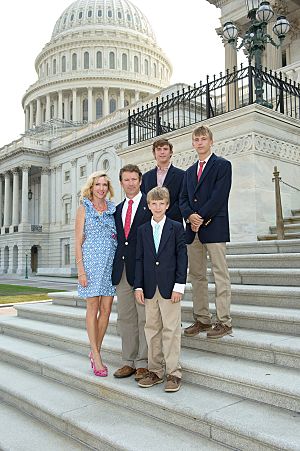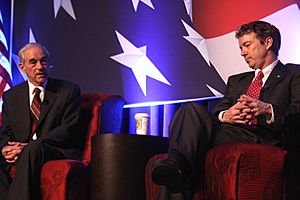Rand Paul facts for kids
Quick facts for kids
Rand Paul
|
|
|---|---|
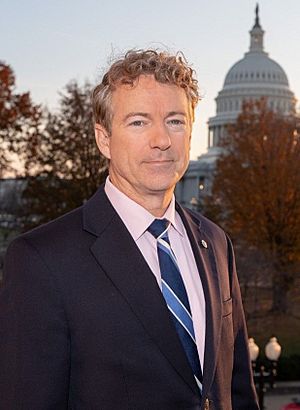
Official portrait, 2022
|
|
| Chair of the Senate Homeland Security Committee | |
| Assumed office January 3, 2025 |
|
| Preceded by | Gary Peters |
| Ranking Member of the Senate Homeland Security Committee | |
| In office January 3, 2023 – January 3, 2025 |
|
| Preceded by | Rob Portman |
| Succeeded by | Gary Peters |
| Ranking Member of the Senate Small Business Committee | |
| In office February 3, 2021 – January 3, 2023 |
|
| Preceded by | Ben Cardin |
| Succeeded by | Joni Ernst |
| United States Senator from Kentucky |
|
| Assumed office January 3, 2011 Serving with Mitch McConnell
|
|
| Preceded by | Jim Bunning |
| Personal details | |
| Born |
Randal Howard Paul
January 7, 1963 Pittsburgh, Pennsylvania, U.S. |
| Political party | Republican |
| Spouse |
Kelley Ashby
(m. 1990) |
| Children | 3 |
| Relatives | Ron Paul (father) |
| Education | Baylor University Duke University (MD) |
| Signature |  |
| Website | |
Randal Howard Paul (born January 7, 1963) is an American politician and eye doctor (ophthalmologist). He has served as a United States senator for Kentucky since 2011. He is a member of the Republican Party. Currently, he leads the Senate Homeland Security Committee.
Paul sees himself as a "constitutional conservative." This means he believes in following the U.S. Constitution very closely. He also supported the Tea Party movement, a political group that wanted less government spending. His ideas are often compared to those of his father, Ron Paul, who was also a politician. Rand Paul studied at Baylor University and earned his medical degree from Duke University. Before becoming a senator, he worked as an eye doctor in Bowling Green, Kentucky, from 1993 until 2010. He was elected to the Senate in 2010, 2016, and again in 2022. He also ran for president in 2016.
Contents
Early Life and Education
Randal Howard Paul was born on January 7, 1963, in Pittsburgh, Pennsylvania. His parents are Carol and Ron Paul. He is the middle child of five. His father, Ron Paul, was also a doctor and a politician.
The Paul family moved to Lake Jackson, Texas, in 1968. Rand grew up there. When he was 13, his father was elected to the United States House of Representatives. Young Rand spent some summers working in his father's office. He also learned about economic ideas that his father admired.
Paul attended Baylor University from 1981 to 1984. He was part of the swim team and a conservative student group. He then went to Duke University School of Medicine, where he earned his medical degree in 1988. He finished his medical training in 1993.
Medical Career as an Eye Doctor
After finishing his training at Duke University, Paul moved to Bowling Green, Kentucky. He has been a licensed eye doctor there since 1993. He worked for different medical groups before starting his own practice in 2008. After he was elected to the Senate, he combined his practice with a former colleague's.
Paul specializes in eye surgeries like cataract and glaucoma operations. He also performs LASIK and corneal transplants. In 2009, he started the Southern Kentucky Lions Eye Clinic. This clinic helps people who cannot afford eye surgery and exams. He received an award for his work with the clinic.
About the National Board of Ophthalmology
In 1995, Paul was certified by the American Board of Ophthalmology (ABO). This group certifies eye doctors. The ABO changed its rules to require doctors to recertify every 10 years. Paul thought this was unfair to older doctors who had lifetime certifications.
In 1999, he created his own group, the National Board of Ophthalmology (NBO). It offered a different way to get certified, at a lower cost. However, other major medical groups did not accept the NBO's certification. Paul kept his ABO certification until 2005. His medical license has always been valid.
Political Activities Before the Senate
Paul was active in politics even before becoming a senator. At Baylor University, he led a local group for young conservatives. In 1984, he helped with his father's campaign for the U.S. Senate. He also volunteered for his father's presidential campaign in 1988.
In 1994, Paul started Kentucky Taxpayers United (KTU). This group worked against tax increases in Kentucky. He often said this group helped him get involved in state politics. Paul also managed his father's successful campaign for Congress in 1996.
Paul often spoke on behalf of his father, especially during his father's 2008 presidential campaign. He campaigned in New Hampshire and spoke at rallies.
In 2014, Paul joined a group called FreedomWorks to file a lawsuit. They argued that the government collecting phone records was against the Fourth Amendment. Paul said he wanted the government to get a judge's approval before looking at individual phone records. He also wrote books like The Tea Party Goes to Washington (2011) and Government Bullies (2012). Time magazine included him on its list of the world's 100 most influential people in 2013 and 2014.
Becoming a U.S. Senator
Running for the Primary Election

In 2009, some people encouraged Paul to run for the U.S. Senate. The current senator, Jim Bunning, was not raising much money for his re-election. Paul said he would run if Bunning decided not to. On April 15, Paul gave his first political speech at a Tea Party rally in Bowling Green.
On July 28, Senator Bunning announced he would not seek re-election. This left Paul and Kentucky's Secretary of State, Trey Grayson, as the main Republican candidates. Paul officially announced his Senate campaign on August 5.
Paul's supporters helped him raise a lot of money quickly. His campaign raised over $433,000 in just 24 hours. This was a new record for Kentucky political fundraising at the time. Paul raised about $3 million during the primary election period.
Paul successfully presented Grayson as a "career politician." He also questioned Grayson's conservative views. On May 18, Paul won the Republican primary with 59% of the votes.
The General Election Campaign
In the 2010 general election, Paul ran against Kentucky Attorney General Jack Conway. The campaign received a lot of money from outside groups. Paul's campaign also raised $6 million, and Conway's raised $4.7 million.
Paul's campaign had a challenging start. He made comments about the Civil Rights Act of 1964 that caused controversy. He said he would have questioned parts of the Act's constitutionality. However, he also said he would have voted for the Act and that he strongly opposes racism. He later clarified that he would not support any efforts to repeal the Civil Rights Act. Paul won the general election with 56% of the vote.
Serving in the U.S. Senate
First Term (2011–2013)
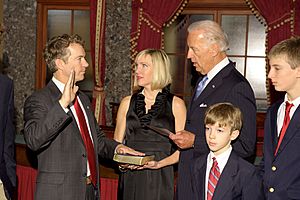

Rand Paul was sworn in as a senator on January 5, 2011. His father, Ron Paul, was serving in the House of Representatives at the same time.
Paul joined several important Senate committees. He also helped form the Senate Tea Party Caucus. His first idea for a law was to cut $500 billion from federal spending in one year. This plan included big cuts to many government departments.
In February 2011, Paul was one of only two Republicans to vote against extending parts of the Patriot Act. He believed these parts gave the government too much power. He also voted against several bills that would prevent government shutdowns, saying they did not cut enough spending.
Paul was against the U.S. getting involved in the Libyan Civil War. He also said he would only support raising the national debt limit if the government agreed to balance its budget. In September 2011, Paul called for a vote of no confidence in the Secretary of the Treasury. He also temporarily blocked a bill to help refugees, asking for an investigation into how some alleged terrorists entered the U.S. through a refugee program.
Second Term (2013–2015)
For his second term, Paul joined the Foreign Relations Committee. He also kept his spots on other committees.
On March 6–7, 2013, Paul spoke for almost 13 hours in the Senate. This type of long speech is called a filibuster. He did this to question the government's use of drones and whether they could be used against American citizens. He asked for a promise that non-combatant citizens would not be targeted on U.S. soil. The Attorney General responded that the President is not allowed to use drone strikes against American citizens on American soil without proper legal steps. Paul was happy with this answer.
In March 2013, Paul and other senators threatened another filibuster. This one was to oppose new laws about gun control. Paul also supported fellow Kentucky Senator Mitch McConnell's re-election campaign.
When Detroit declared bankruptcy, Paul said the federal government should not bail out the city. He believed it would send the wrong message to other cities with money problems. In September, Paul said the U.S. should avoid military action in the Syrian Civil War. He argued that diplomatic efforts were more effective.
In October 2013, Paul faced some criticism. It was found that he had used parts of speeches and writings from other sources without giving them credit. He said he was being held to an "unfair standard" but would change how his office worked to prevent future mistakes.
In early 2014, Paul first said the U.S. should be careful not to provoke Russia regarding Ukraine. However, after Russia's military actions in Ukraine, Paul changed his tone. He said Russia "must be punished" and that the U.S. should impose economic sanctions. He also called for building anti-missile systems in Poland and the Czech Republic.
Paul helped block a treaty with Switzerland that would allow the IRS to investigate tax evasion. He argued it would harm Americans' privacy. In December 2014, Paul supported President Obama's decision to change U.S. policy towards Cuba and ease trade restrictions.
Third Term (2015–2017)
In 2015, Paul introduced a bill to make the Federal Reserve more transparent. He also introduced the FAIR Act, which would limit how police can seize property without a conviction. On May 20, 2015, Paul spoke for over ten hours against renewing parts of the Patriot Act. He argued these parts were unconstitutional.
After the death of Supreme Court Justice Antonin Scalia in February 2016, Paul said he would oppose any person President Obama nominated to replace him.
In May 2016, President Obama asked Paul to stop blocking tax treaties. Paul also spoke about ending gun-free zones. In June, he talked about introducing a law to end Selective Service, which requires young men to register for military service.
Fourth Term (2017–2019)
In March 2017, Paul introduced a bill to stop the U.S. government from helping groups like Al Qaeda and ISIL. He also had a public disagreement with Senator John McCain about adding Montenegro to NATO.
Paul questioned President Trump's missile strike on Syria in April 2017. He said the U.S. was not attacked and that further action needed approval from Congress. Paul was one of 22 senators who asked President Trump to withdraw the U.S. from the Paris Agreement on climate change.
In October 2017, Paul said he would not vote for the Republican budget unless billions of dollars in spending were removed. In February 2018, Paul was one of 14 Republican senators to vote against an immigration plan that included money for border security and a path to citizenship for some immigrants.
FiveThirtyEight, a group that tracks votes, found that Paul voted with Donald Trump's positions less often than most other Republicans. In December 2018, Paul played down accusations of campaign finance violations against President Trump. He said such violations should not be "over-criminalized."
Healthcare Reform Efforts
On January 25, 2017, Paul introduced a bill to replace the Affordable Care Act (Obamacare). His plan included a tax credit for individuals and would not require everyone to have health insurance.
Paul was very active in the debate over repealing and replacing Obamacare. He argued that repealing and replacing should be two separate bills. He also criticized House Speaker Paul Ryan's approach to the new healthcare bill. When the bill was pulled from a vote, Paul thanked House conservatives for opposing what he called "ObamaCare Lite."
Paul continued to oppose later versions of the healthcare bill, like the Graham-Cassidy bill. He said it kept "90% of Obamacare" and was a "big government boondoggle." When President Trump tweeted that senators who voted against the bill would be known as "the Republican who saved Obamacare," Paul responded that he would not be forced to support it.
Fifth Term (2019–2021)
In January 2019, Paul criticized Senator Mitt Romney for writing an article that criticized President Trump. Paul said it was bad for the country and the Republican Party.
On July 17, 2019, Paul temporarily blocked a bill to renew the September 11th Victim Compensation Fund. He said he wanted a vote on an amendment that would cut other spending to pay for the fund. He argued that he always insists on "pay-go provisions" for new spending.
In November 2019, Paul called on the media to reveal the identity of the person who reported concerns about President Trump's actions in Ukraine. In February 2020, Paul criticized YouTube for removing a video of his speech during President Trump's impeachment trial.
In September 2020, Paul was the only Republican to vote against a COVID-19 aid package. He was concerned about how much it would add to the national debt. After the 2020 United States presidential election, Paul claimed the election was "stolen."
Sixth Term (2021–2023)
Paul continued to claim the 2020 election was fraudulent, but he later accepted the official results. During the counting of the Electoral College votes, which followed the January 6 United States Capitol attack, Paul condemned the attack. He called it "violence and mob rule" and "un-American."
In President Trump's second impeachment trial, Paul questioned whether it was constitutional since Trump had already left office. He also defended Trump against the charges. Paul formally voted against the impeachment charges.
In May 2022, Paul blocked a bill that would provide $40 billion in aid for Ukraine during the Russian invasion. He said there needed to be a special inspector to oversee how the money was spent.
Seventh Term (2023–2025)
In March 2023, Paul gained attention for blocking a bill that would ban the app TikTok in the United States. He said he believed a ban would go against First Amendment rights. He also argued that U.S. tech companies had not always protected user data well.
On January 11, 2024, Paul announced he would make a major statement about the 2024 Republican Party presidential primaries. The next day, he spoke against Nikki Haley becoming president, launching a website called "Never Nikki." He said he opposed her foreign policy ideas, especially increasing funding for Ukraine. He also mentioned he liked Donald Trump, Ron DeSantis, Vivek Ramaswamy, and Robert F. Kennedy Jr., but did not officially support any of them.
Committee Assignments
Paul serves on several important Senate committees:
- Committee on Foreign Relations
- Committee on Health, Education, Labor, and Pensions (He leads the Subcommittee on Children and Families.)
- Committee on Homeland Security and Governmental Affairs (He leads the Subcommittee on Emergency Management, Intergovernmental Relations, and the District of Columbia.)
- Committee on Small Business and Entrepreneurship (He is the Ranking Member, meaning the top Republican.)
2016 Presidential Campaign
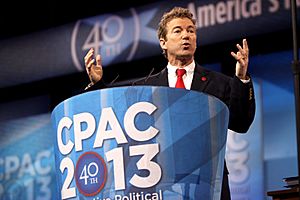
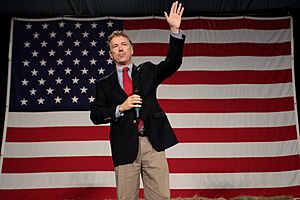
Rand Paul was considered a possible candidate for president as early as 2013. He gave a speech at the Conservative Political Action Conference (CPAC) and won their straw poll for three years in a row. This made some people think he was a strong contender for the nomination.
In April 2014, Paul said the Republican Party needed to attract more people. He believed it should not be seen as the party of "fat cats, rich people and Wall Street." He said conservatives should focus on justice and help for the unemployed.
Paul officially announced he was running for president on April 7, 2015. He raised $1 million within a day of his announcement.
Ending His Presidential Campaign
Paul ended his presidential campaign on February 3, 2016. This was shortly after the Iowa caucus, where he finished in fifth place.
Political Views
Paul describes himself as a "constitutional conservative" and a supporter of the Tea Party movement. He is often called a libertarian. This means he believes in individual freedom and limited government. He supports term limits for politicians and a balanced budget amendment to the Constitution. He also wants to reduce federal spending and taxes. He favors a flat tax rate of 14.5% for individuals and businesses.
Immigration
In 2017, when the DACA program was ended, Paul said the executive order that created it was illegal. He believed that Congress needed to work together to fix the program. In 2019, he was one of 11 Republicans who voted against President Trump's request for emergency border funding.
LGBTQ+ Rights
Paul has said that same-sex marriage "offends" him personally. In 2010, he supported a constitutional amendment to ban same-sex marriage nationwide. Before the Supreme Court made same-sex marriage legal across the U.S. in 2015, Paul believed states should decide the issue. After the Court's decision, he said he disagreed with it but believed all Americans have the right to make contracts.
Foreign Policy
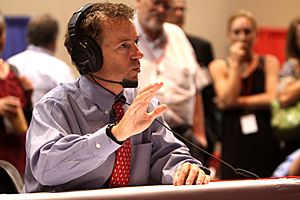
Unlike his father, who was strongly against U.S. involvement in other countries, Paul believes American forces can play a role abroad. He has criticized the Iraq War, saying it made groups like ISIS stronger. He supported airstrikes against ISIS but questioned if President Obama had the right to act alone without Congress's approval. In December 2018, he supported President Trump's decision to pull U.S. troops out of the Syrian Civil war.
Paul has also criticized U.S. support for the Saudi Arabian-led intervention in Yemen. He said Saudi Arabia has funded groups that teach hatred of America. He also pointed out that the U.S.-backed Saudi blockade of Yemen has made the humanitarian crisis worse.
In June 2019, Paul criticized the Trump administration for increasing tensions with Iran. He said an Iran war would be "even a bigger mistake than the Iraq War." In January 2020, he criticized the U.S. airstrike that killed Iranian General Qasem Soleimani.
In July 2018, Paul was one of only two senators to vote against a Senate motion supporting NATO. On July 1, 2020, the Senate rejected Paul's idea to withdraw all U.S. forces from Afghanistan within a year.
On May 12, 2022, Paul stopped a vote on a $40 billion aid bill for Ukraine. He said it was the second such bill and much larger than the first. He wanted to ensure there was proper oversight for how the money was spent.
Criminal Justice Issues

Paul has focused on changing the criminal justice system. He has introduced bills to give judges more flexibility in sentencing and to restore voting rights for non-violent felons. He also supports sealing and clearing records for non-violent crimes. He wants to limit how police can seize property without a conviction. Paul has also pushed for police to use body cameras and for less military equipment to be used by police. He supports protecting pregnant women in prison and ending "no-knock warrants." Paul believes that policies like the "war on drugs" have especially harmed minority groups.
Government Surveillance
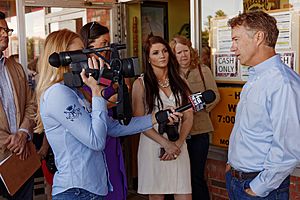
Paul is a critic of government surveillance without warrants. He believes the Fourth Amendment, which protects privacy, is as important as the Second Amendment, which protects the right to bear arms. In 2015, he spoke for over ten hours against renewing parts of the PATRIOT Act that he said were unconstitutional. He has called Edward Snowden a "whistleblower" for revealing government surveillance programs.
Climate Change
Paul has not fully accepted the scientific agreement that global warming is real and caused by humans. He has said that pollution emissions are subject to "onerous regulation." In 2018, he called for an investigation into a grant that helped educate meteorologists about climate change. He called it "propagandizing."
Animal Rights
In 2021, Paul helped pass the FDA Modernization Act 2.0. This law removed the requirement for new medicines to be tested on animals before human trials. Paul said the bill would help "end the needless suffering and death of animal test subjects." The law was signed by President Joe Biden in December 2022.
After the law passed, the FDA was slow to update its rules. In November 2023, Paul wrote a letter to the FDA asking them to follow the new law. In January 2025, Paul introduced a new version of the law to make the FDA revise its rules faster.
Disease Control
In 2015, Paul said that most vaccinations should be voluntary. He believed parents should have the freedom to decide for their children. He later clarified that he thinks vaccines are a good idea. In May 2020, Paul said that stay-at-home orders during the COVID-19 pandemic were like a "dictatorship."
Paul has also spread some claims about the safety of vaccines. In 2014, he argued that the Obama administration was downplaying the threat of the Ebola virus in the U.S.
In September 2020, Paul had a public disagreement with Dr. Anthony Fauci, a top health official. Paul questioned the effectiveness of mask-wearing and social distancing. Fauci said Paul had "misconstrued" the information.
In May 2021, Paul said he chose not to get the COVID vaccine because he had already had the disease and believed he had "natural immunity." He argued that in a free country, individuals should make their own medical decisions. In August 2021, Paul was temporarily suspended from YouTube for sharing false claims about masks.
Health Care
Paul supports getting rid of the Affordable Care Act (Obamacare). He is against universal health care, which he once compared to slavery. Instead, he favors expanding health savings accounts and providing a $5000 tax credit. He also wants to allow health insurance to be sold across state lines. His plan would allow people with pre-existing conditions to get coverage for two years.
Term Limits
In November 2019, Paul signed a promise to support a constitutional amendment to limit senators to two terms. However, he was elected for his third term in 2022. He said he supports term limits for everyone, not just for himself, and that it would require a constitutional change.
Economic Issues
Paul supports a balanced budget amendment to the U.S. Constitution. This would require Congress to balance the budget every year. He has proposed a "Penny Plan" to reduce federal spending by 1% each year to balance the budget in five years. Paul has also opposed raising the national debt limit without big spending cuts.
When he ran for president in 2016, Paul suggested a "Fair and Flat Tax" plan. He said it would replace the current tax code with a low, flat tax of 14.5% on individuals and businesses.
Paul has also introduced bills to audit the Federal Reserve. He believes it's important to look closely at the Fed's money decisions.
Veterans
In 2022, Paul was one of 11 senators who voted against the Honoring our PACT Act of 2022. This bill provided funding for research and benefits for veterans exposed to toxic substances during their service.
Personal Life
Rand Paul is married to Kelley Paul, a writer. They married on October 20, 1990. They have three sons: William, Duncan, and Robert. The family lives in Bowling Green, Kentucky. They are active in their church.
See also
 In Spanish: Rand Paul para niños
In Spanish: Rand Paul para niños
- Electoral history of Rand Paul
- List of politicians affiliated with the Tea Party movement
- Physicians in the United States Congress
 | William Lucy |
 | Charles Hayes |
 | Cleveland Robinson |


